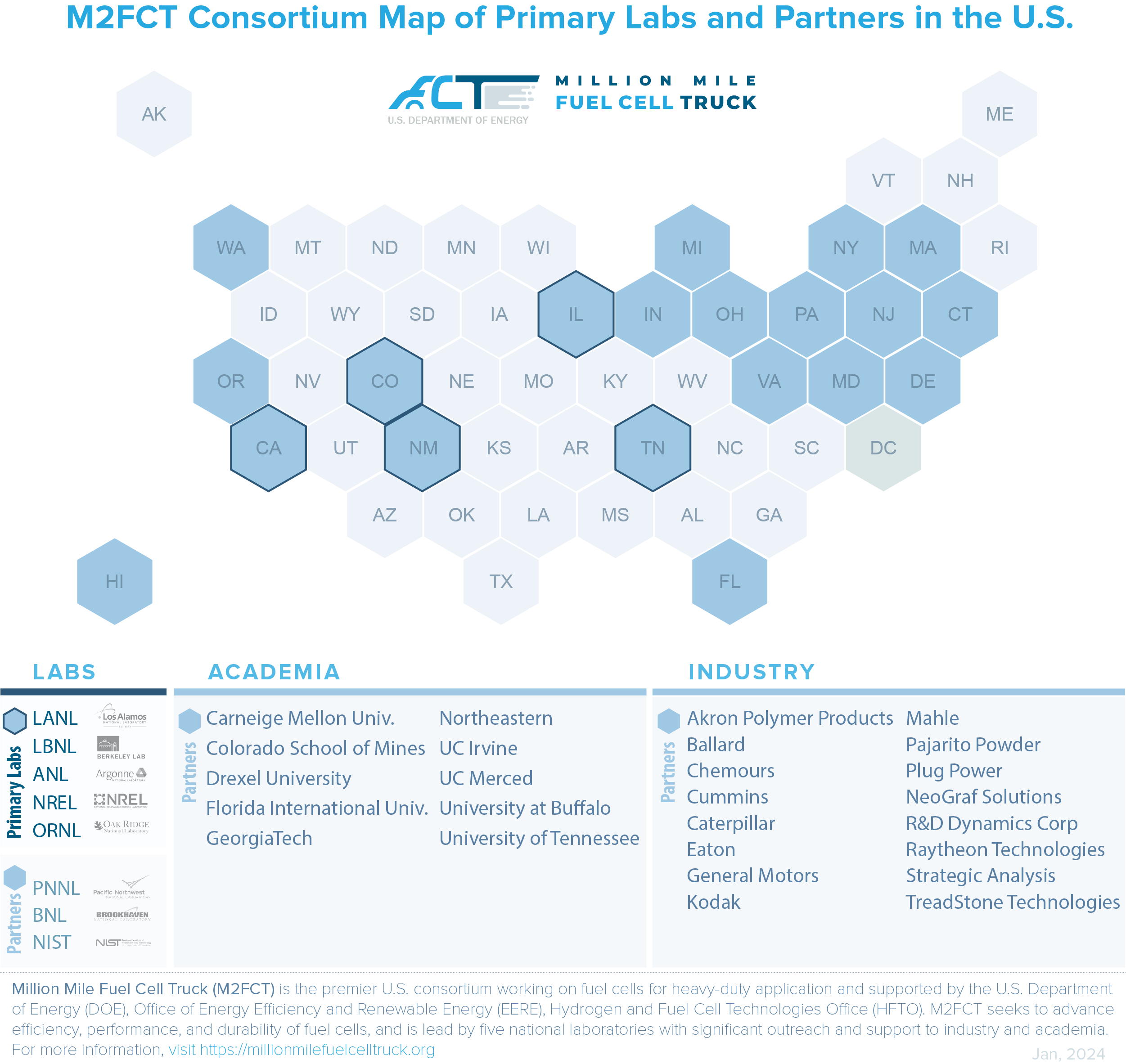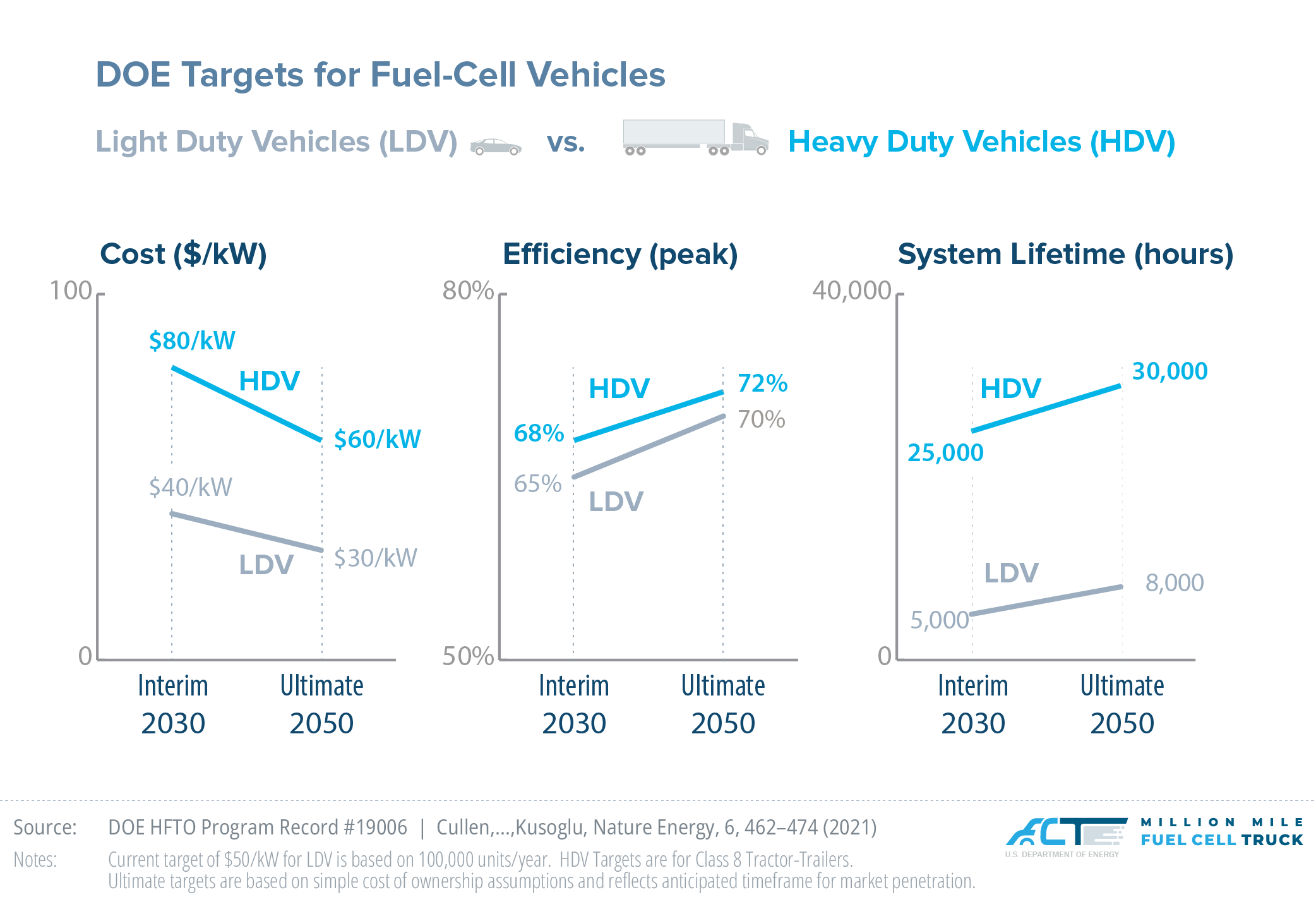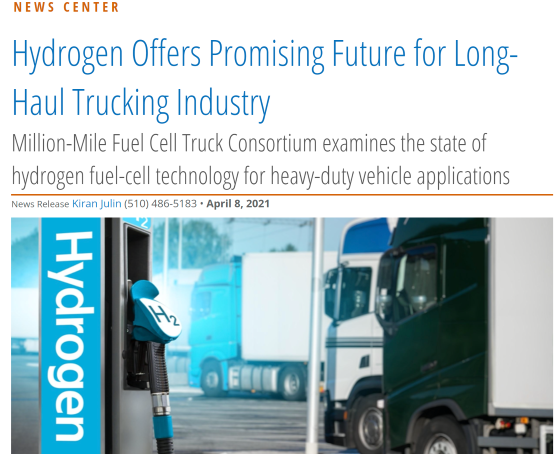Our Mission
To advance efficiency and durability of proton exchange membrane fuel cells at a pre-competitive level to enable their commercialization for heavy-duty vehicle applications with an initial focus on long-haul trucks.
Our Focus
Electrification is a paradigm shift for the transportation sector that provides a promise of clean, renewable means of moving goods and people. For heavy-duty applications that require more power and longer range, green clean hydrogen is a compelling fuel that provides a future fleet of clean, emission-free vehicles. To realize this reality of hydrogen-fueled vehicles in the heavy-duty regime, there is a need to improve the fuel cells that convert the hydrogen fuel to electricity on board the vehicle. The type of fuel cell being developed for heavy-duty vehicles (HDVs) is a proton-exchange membrane fuel cell (PEMFC).
Hydrogen-fueled PEMFCs have many benefits over internal combustion engines (ICEs) and pure battery-powered propulsion used in the transportation sector, including higher efficiency and better scalability and refueling, respectively. The PEMFC technology for HDVs, however, requires a paradigm shift in fuel-cell research and development compared to the current state of the technology for light-duty vehicles (LDVs), which has been achieved decades-long research and progress. Instead of a focus on increased power densities and lower cell costs as was the case for LDVs, M2FCT will focus on commercialization of fuel-cell trucks which demand a greater focus on efficiency and significantly longer lifetimes, and 4 to 5x improvements in durability.
Who We Are
Million Mile Fuel Cell Truck (M2FCT) is a Department of Energy (DOE)-funded consortium formed by five primary national labs to overcome durability and efficiency challenges in PEMFCs for heavy-duty applications with an initial focus on long-haul trucks. The consortium coordinates National Laboratory activities related to fuel-cell efficiency and durability, provides technical expertise, and harmonizes activities with industrial developers across the Hydrogen and Fuel Cell Technology Office's HDV PEMFC portfolio, which is located in DOE's Office of Energy Efficiency & Renewable Energy, thus amplifying their impact.
M2FCT comprises five principle National Laboratories listed below and 3 affiliate laboratories as well as supports various industry- and academia-led projects.
National Laboratory Consortia Members:
- Los Alamos National Laboratory (LANL)
- Lawrence Berkeley National Laboratory(LBNL)
- Argonne National Laboratory (ANL)
- National Renewable Energy Laboratory (NREL)
- Oak Ridge National Laboratory (ORNL)
Explore our partners
What We Do
We envision the M2FCT consortium as a beacon in the community and clearinghouse for data and ideas, while providing proactive leadership and guidance under its umbrella of lab, academic, and industrial projects. We plan to strengthen domestic competitiveness with a focus on HDV requirements.
The M2FCT consortium is focused on achieving an aggressive target for PEMFC HDV membrane electrode assemblies (MEAs) that combines efficiency, durability, power density, and implicitly, cost in a single metric:
2.5 kW/gPGM power (1.07 A/cm2 current density) at 0.7 V after 25,000 hour-equivalent accelerated durability test.
Beyond the 2025 target, the consortium will increase the system efficiency to meet the DOE efficiency targets of 68% (2030) and 72% (ultimate), and durability targets of 30,000 hours (ultimate) for long-haul trucks, as shown below. The durability targets for other HDVs include 35,000 hours for locomotives and 100,000 hours for marine applications.

Read more about fuel-cells for trucks and heavy-duty applications: Nature Energy article
Contact Us: [email protected]
Read our Nature Energy review on how hydrogen fuel cells could help decarbonizing the heavy-duty vehicles and freight transportation
Million-Mile Fuel Cell Truck Consortium and their research on developing the state of hydrogen fuel-cell technology for heavy-duty vehicle applications have been covered in a Press Release



